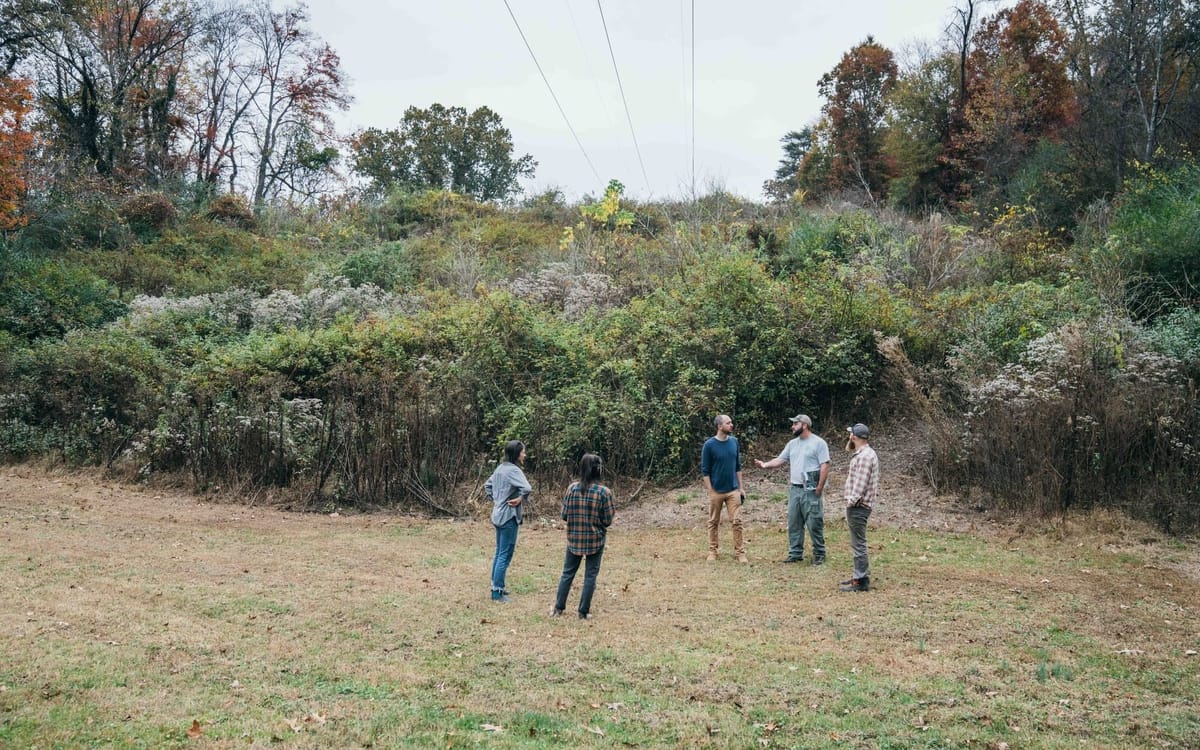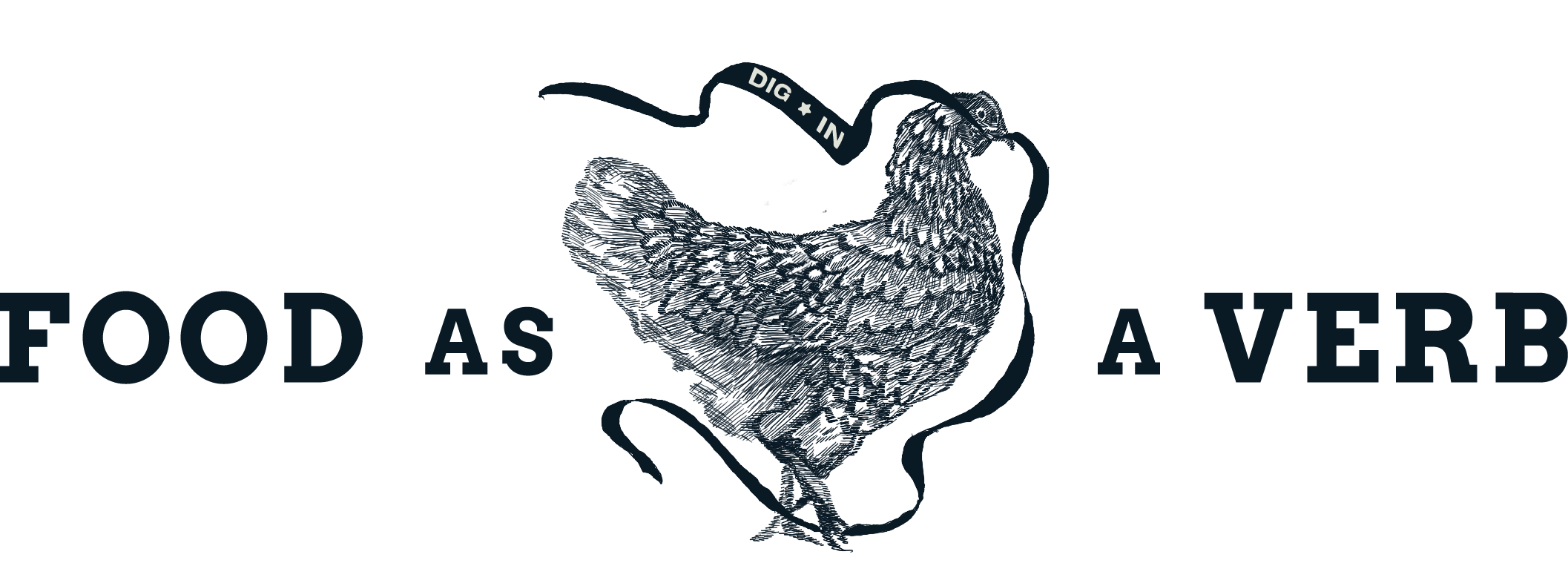Meet the No Name Homestead
In Red Bank, two young families are working on a very old idea.

In Red Bank, two young families are working on a very old idea.
"A carbon-sequestering plot right in the city center."
Photos and words by Julie Ellison
As travel nurses working in Everett, Washington, in 2020, Amy Dunham and Steven McKinney were some of the first people to experience the Covid-19 pandemic as frontline healthcare professionals. After long shifts tending to sick patients in the ER of a mid-size city near Seattle, the couple would return to their temporary home on Whidbey Island, a regenerative agriculture farm where Amy's brother shears sheep and raises livestock in a healthy and humane way.

Growing their own food, living closer to nature, and being more self-reliant became appealing for the couple, who have a 4-year-old daughter named Sage. They got inspired to return to their home base in Chattanooga, Tennessee, buy a piece of land, and build a homestead. It just so happened that their good friends Chris Winters and Kate Hanes shared a similar vision for their lives.

The couples joined forces to find and purchase two neighboring parcels of land, with a promise to the seller that they would return the land to its former glory as a farming property. The owner didn't have any heirs, and he liked the idea of his family's land being used to grow things instead of being turned into a development.



Above: Walking the property line marked by barbed wire growing through the middle of a tree. Below: The walls of the original home are made of unique T-shaped bricks from a Chattanooga brick factory.
Thus, the homestead project was started. The foursome (plus Sage) aim to preserve this property by developing a land management plan, encouraging wildlife habitat and building garden beds, among other things. Their first step for the management plan is figuring out what their priorities are and how they want to use the land.



Plant diversity of age and species is important for any ecosystem. The Red Bank property has some massive old-growth trees on it, including an enormous cherry bark oak (left).
They want to prioritize natural beauty, wildlife habitats, diversity and healthy soil while also being able to raise animals and grow food. Their goals are lofty but doable.
"A carbon-sequestering plot right in the city center," Steven says.


Dead trees, still standing and on the ground, offer ample opportunities for insect, bird, and mammal habitat.
Picture this: A robust composting program that turns organic waste into living soil for garden beds, a one-acre orchard, mushroom pits, forested areas with open space at ground level for chickens and wild turkeys to pick their way through. Turmeric, ginger and paw paws growing all over, a rainwater collection system, stacks of bee boxes, deer sauntering through to munch on blackberries and goats grazing across the property.


Building a compost bin and soil pit for earthworms was one of the first tasks they completed.

Initially, they aim to grow food for their own families, but in the future, they hope to be able to harvest enough to share with the community. In order to make all this a reality, they have applied for technical and financial assistance through the Environmental Quality Incentives Program (EQIP), run by the Natural Resources Conservation Service (NRCS). This grant helps farmers, ranchers and forest landowners incorporate conservation goals into their management practices. As part of the U.S. Department of Agriculture, NRCS sent biologist Richard Underwood to the site in early November to assess the property and discuss a strategy to achieve their goals of improving habitat, growing food and fostering native plants.


Left: Surveying the original home on the property, which will most likely turn into a shelter for future goats. Right: Searching for #13 jars, which were smashed by past generations because of superstitions that suggested they were unlucky. Finding a #13 jar intact these days is a rarity.



Identifying trees, shrubs, and grasses to figure out what is native and how each might function in the ecosystem.


Talk about perfect timing. A deer casually strolled onto the scene during the walkabout with the USDA biologist.
This is not a year-long commitment that ends after a neat little 12 months. This is a lifetime goal to turn nine acres in the heart of Red Bank into a diverse, lively, productive parcel of land. For the time being, they're calling it No Name Homestead (@no.name.homestead). In Steven's own words: "We haven't come up with a name just yet. It's going to be part of the journey."
**This is the first part of a series about the Red Bank homestead project, where we will share stories about this particular piece of land and how the families are progressing in their goals to conserve nature and grow food on their property.
Photos and words by Julie Ellison. Visit JulieEllison.com.
Story ideas? Interested in sponsorship opportunities + supporting our work? Feedback or questions? Email David Cook at david@foodasaverb.com. This story is 100% human generated; no AI chatbot was used in the creation of this content.
Food as a Verb thanks our sustaining partners for their generous support.





Tucker Build offers Chattanooga a commercial construction firm made up of design-build experts specializing in the planning, building and managing process. Female-and-locally owned, Divine Goods offers beautifully curated gifts for every occasion. Be divine and send someone special a Divine Goods gift - locally sourced when possible, and always thoughtful. Now open in St. Elmo, Little Coyote blends together Texas barbeque, Cuban, Caribbean and Southwestern influences – smoked meats, stunningly original tortillas, 100 varieties of tequilas, sotols and mezcals – for a family-style restaurant experience unlike any other in Chattanooga. For more than 25 years, Lupi's Pizza Pies has served locally-sourced, creatively-made and award-winningly delicious pizza from five nearby locations. Niedlov's Bakery & Cafe, a Main St. anchor, has elevated our city's bakery experience to beautiful levels while strengthening community in immeasurable ways.
Regional Farmers' Markets
Main St. Farmers' Market
Corner of W. 20th and Chestnut St., near Finley Stadium
Wednesday, 4 - 6pm
Brainerd Farmers' Market
Grace Episcopal Church, 20 Belvoir Ave, Chattanooga, TN
Saturday, 10am - noon
Chattanooga Market
1820 Carter Street, Sunday, 11am - 4pm
Ooltewah Farmers' Market
The Ooltewah Nursery, Thursday, 3 - 6pm
Signal Mountain Farmers' Market
Pre-order online for Thursday pick-up between 4 - 6pm at Bachman Community Center
St. Albans Farmers' Market
7514 Hixson Pike, Saturday, 9.30am - 12.30pm with a free pancake breakfast every third Saturday
Walker County Farmers' Market
Wednesday, 2 - 5 pm, Rock Spring Ag. Center
Saturday, 9 am - 1 pm, downtown Lafayette, Georgia
To include your farmers market, email david@foodasaverb.com
